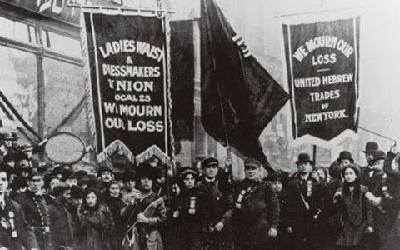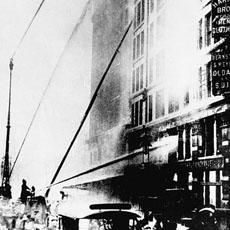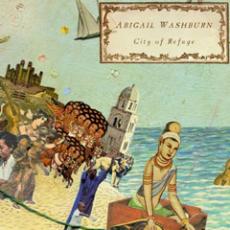
MARIO RITTER: Welcome to AMERICAN MOSAIC in VOA Special English.
(MUSIC)
I'm Mario Ritter. This week, music from banjo-playing singer Abigail Washburn. And we answer a timely question about a tragic fire 100 years ago that changed working conditions in American factories.
(MUSIC)
Triangle Factory Fire
MARIO RITTER: Our question comes from Bogota, Colombia. It is such a big question this week that both Faith Lapidus and I will answer it together.
Mercedes asks about a fire at an American factory that killed many women workers who were locked inside.
That tragic event was the Triangle Waist Company factory fire. It happened in the Greenwich Village area of New York City on March 25th, 1911. The fire in the upper three floors of the ten-floor building was over in less than half an hour.
But 146 people were killed in that short time. The large majority were young women, some of them girls.
It was the worst workplace disaster in New York City history until the terrorist attacks on the World Trade Center in 2001.
A shirtwaist was a main piece of clothing for women at the time. The Triangle Waist Company was the largest maker of these garments. Isaac Harris and Max Blanck owned the business and were known as the "Shirtwaist Kings."
Experts say they were successful, in part, because of the complete lack of protections for workers in those days. There were no rules about pay, hours or safety. The employees at Triangle generally worked 14-hour days, six days a week. Most were young, female and immigrants. They had to pay for their materials and any sewing mistakes they made.
Max Blanck and Isaac Harris also had little trust in their workers. And this lack of trust led to many of the deaths that spring day.
The fire broke out just before five o'clock in the afternoon. The workers were minutes from ending their work day. Reports say the fire started on the 8th floor, probably from a cigarette in a waste container.
The many hanging shirtwaists fed the fire. It spread very quickly. There was telephone service from the 8th to the 10th floor where the owners were. Mr. Blanck and Mr. Harris were warned about the fire. They climbed to the roof and then to another building.
But the workers on the 9th floor did not know of the fire until the smoke and flames surrounded them.
(MUSIC)
FAITH LAPIDUS: The building had no water sprinkler system, although others in the city did. It also had just one fire escape – metal stairs on the outside of the building. Some of the workers were able to climb down the fire escape before the poorly made metal structure collapsed.
Other workers tried to ride the elevator down to the first floor. But in time the fire blocked it. Many victims then jumped down the elevator shaft to avoid being burned.
Some workers tried to escape through an exit door to a stairwell. But soon fire and smoke made it impassable. Workers then raced to another door that led to another set of stairs. But they could not open the door. Earlier, the door had been locked from the outside so the workers could not leave early or steal anything.

Women began to gather at the windows of the burning building. A huge crowd had gathered below. The women were yelling for help. They crawled out onto the edges of the windows. People in the crowd screamed "Don't jump." But some of workers jumped to their death. When the fire engines arrived the ladders reached only to the 6th floor.
It was over just a few minutes after the fire fighters arrived. One hundred twenty-nine women and girls and 17 men were dead. The youngest victim was 14-year-old Rosaria Maltese. She had come to the United States from Italy four years earlier. Her mother and sister died with her in the fire.
Most of the victims were Jewish women, many from Russia. One victim, Fannie Rosen, had only been in the United States for six months. It was her second day on the job at Triangle Waist Company.
Just last month, the remaining unidentified victims of the Triangle fire were finally named. The work was done by researcher Michael Hirsch. Mr. Hirsch became interested in the fire after he learned that one of its victims lived on the same street he lives on in the East Village area of New York.
Mr. Hirsch's four years of work will make a big difference at the 100th anniversary observance March 25th. For the first time, the names of all the fire's victims will be read at a memorial service at the building where the tragedy happened.
(MUSIC)
MARIO RITTER: Two years before the fire, a Triangle workers' strike led to a huge general strike of women garment workers in New York City. The women were demanding the right to organize for safer working conditions, better pay and other rights. While many garment workers in other factories joined unions as a result, the Triangle workers did not. The fire was seen as even more tragic because of this.
Max Blanck and Isaac Harris were charged with responsibility for the deaths from the fire. However, they were found not guilty. They received insurance money and continued in the business. In fact, Mr. Blanck again locked workers in a factory in 1913. He was arrested and fined a small amount.
However, many things did change as a result of the Triangle tragedy. A special committee was created to investigate factory and worker safety in workplaces across the state. It reported many violations and supported new safety laws. And the International Ladies Garment Workers Union gained many members, greater respect and more power.
The Triangle factory fire is being remembered this month. The Public Broadcasting System's television program "American Experience" broadcast a documentary called "Triangle Fire." The cable channel HBO is also broadcasting a documentary co-produced by Michael Hirsch. It is to air on the anniversary weekend of March 25th. New York University has a special exhibit about the tragedy. NYU now owns the building which housed the Triangle Waist Company. Other related stage and art shows are also being held in the city.
(MUSIC)
Abigail Washburn
HOST:
Abigail Washburn writes and performs songs influenced by bluegrass music. She has made albums with the traditional music band Uncle Earl and a group of musicians called The Sparrow Quartet. Washburn recently released her second album performing on her own. "City of Refuge" is influenced by bluegrass as well as other kinds of music. Bob Doughty tells us more.
(MUSIC)
BOB DOUGHTY: That was the song "Corner Girl" from Abigail Washburn's latest album, "City of Refuge." You can hear her playing the banjo, a traditional bluegrass instrument. But Washburn is also influenced by other kinds of music.
One song on her new album includes folk singers from Mongolia. On others you can hear the traditional Chinese instrument called the guzheng.

Abigail Washburn has a special love for China. She speaks Mandarin and has spent time living, travelling and performing in China. She has said that trying to create an album completely free of Chinese influence would be like ignoring a big part of who she is.
Here is the song "Chains," which has a very different sound.
(MUSIC)
Abigail Washburn says she considers herself an outsider or foreigner in most situations because she has traveled so much in her life. But she says that music gives her a feeling of being home. She says music is a refuge because it offers common ground for all people. We leave you with her new album's title song, "City of Refuge."
(MUSIC)
MARIO RITTER: I'm Mario Ritter. Our program was written by Dana Demange and Caty Weaver who was also the producer.
If you have a question about American life, write to mosaic@voanews.com. We might answer your question on this show. So please include your name and country.
Join us again next week for AMERICAN MOSAIC, VOA's radio magazine in Special English.
15 dead, 12 injured in Philippines hotel fire
(來源:VOA 編輯:崔旭燕)
